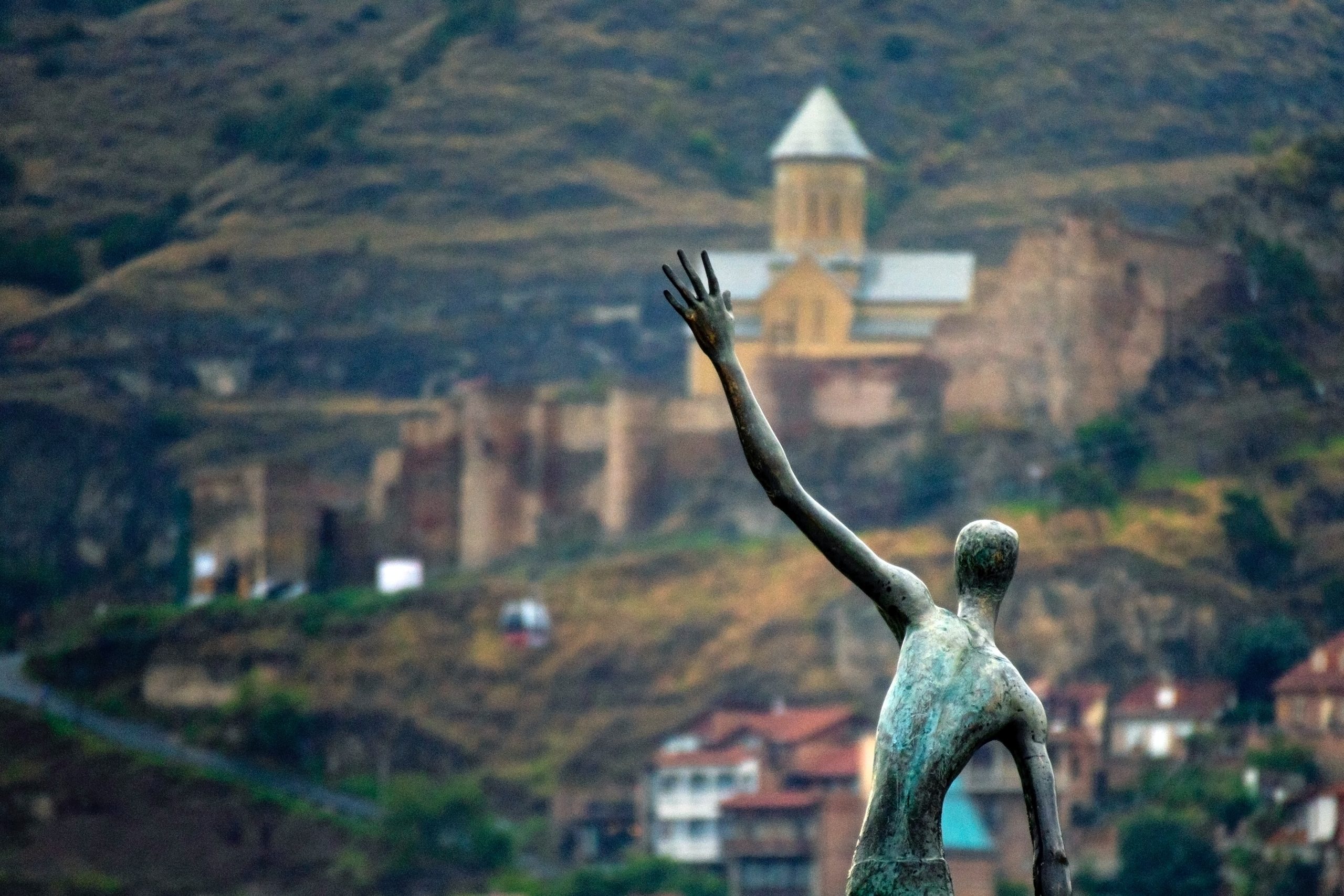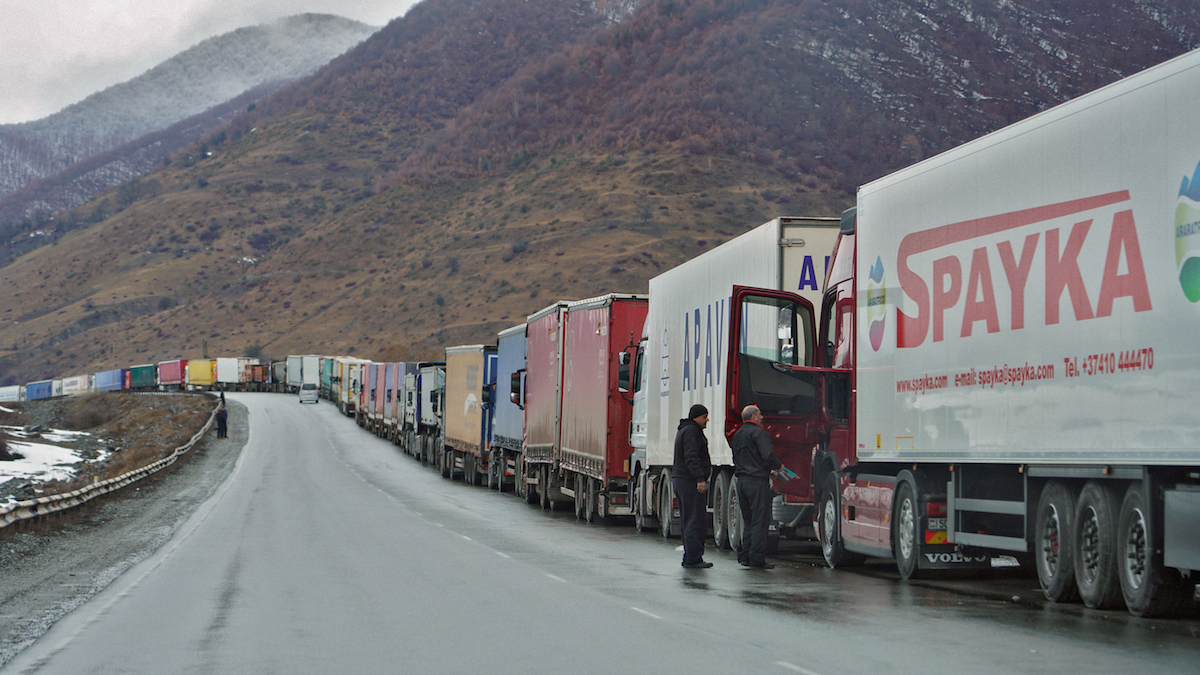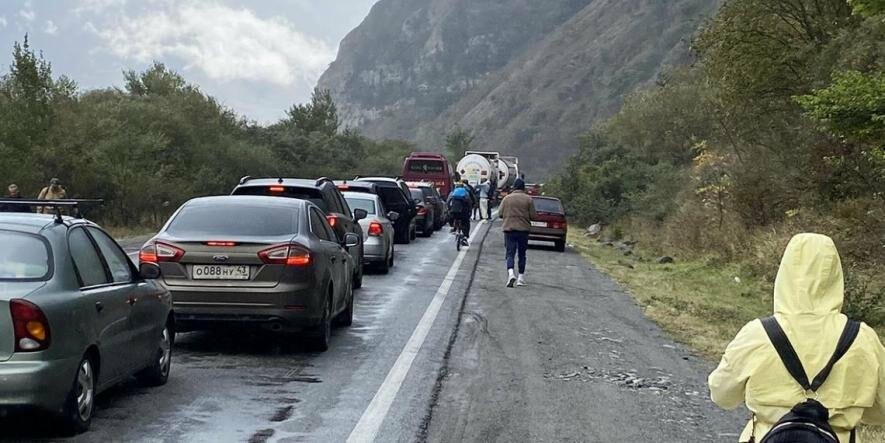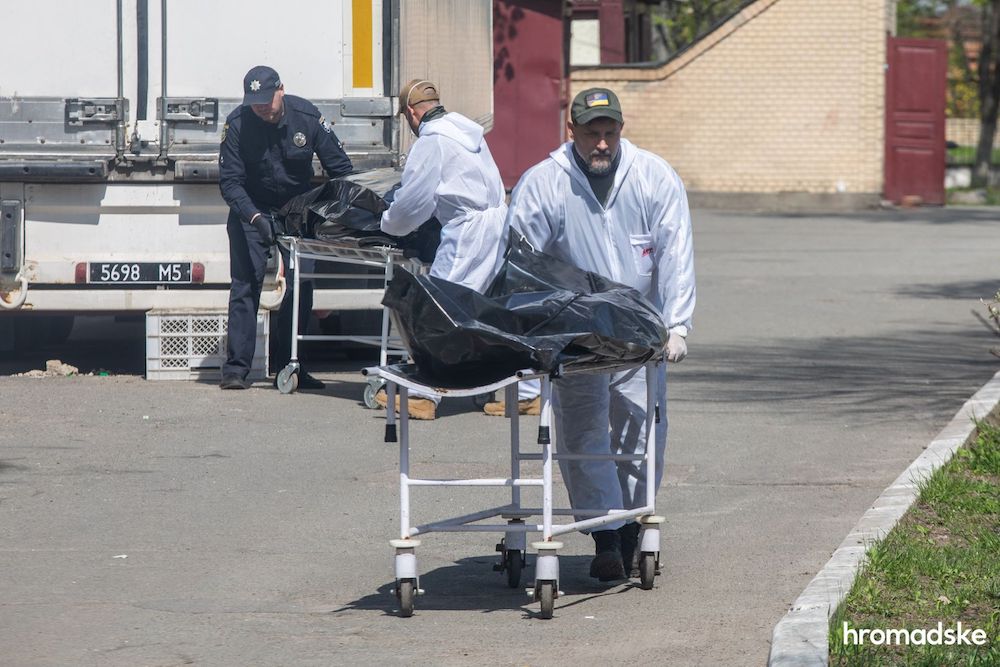"If they close the border, there will be only one way left - war." Stories of refugees from Russia
Thousands of Russians have fled their country
At the end of September, thousands of Russian citizens fleeing from Russia gathered at the Georgian-Russian land border at the Upper Lars checkpoint. In just a few days a huge traffic jam 15-20 kilometers long developed on the way into Georgia.
Mostly young people, those affected by partial mobilization, went on the move. But women with children also crossed the border – some on foot, some by bus, on bicycles, in cars. Most of them spent five days on the road without water, food, warm clothes or shelter.
- Mobilization in Russia: Will it change anything? Opinion
- How long the war in Ukraine might go on, how many victims, how it may end for Russia
- Should Georgia close its border with Russia? Authorities and opposition on the mass exodus of Russians
JAMnews spoke to these refugees about their means of travel, why they chose a country where they may feel unwelcome, and whether they see their future in Georgia.
On September 21, President Vladimir Putin announced a partial military mobilization in Russia. This means that those who have already undergone military training may go to war – first men from 18 to 35 years old, then from 35 to 45 years old. About 300,000 may be called up, according to Russian Defense Minister Sergei Shoigu. However, the publication Novaya Gazeta Europe wrote that a seventh, secret paragraph of the decree on mobilization allows the Ministry of Defense to call up to a million people. Panic broke out in Russia.
Many in Georgia consider the flight of thousands of Russians to the country extremely dangerous. The opposition demands the border be closed, and a visa policy, even fees, be introduced for Russians. Others say that closing the border to people fleeing the war is inhumane. Most want their movement to at least be controlled. But this is where the main fear lies – almost everyone in Georgia believes that the current government is not capable of this.
The Georgian government sees no problem; ministers say that nothing special is happening. The Ministry of Internal Affairs has published statistics showing that the majority of refugees do not stay in Georgia. In ten days, from 17 to 27 September, about 79,000 Russian citizens entered Georgia and 62,000 left. The opposition does not believe these figures.
Thousands of people who fled Russia are in Georgia
In the Kazbegi municipality, near the Daryal checkpoint, people and cars are jumbled up. The area around the border is like a battlefield. Garbage is all around, and police struggle to maintain order.
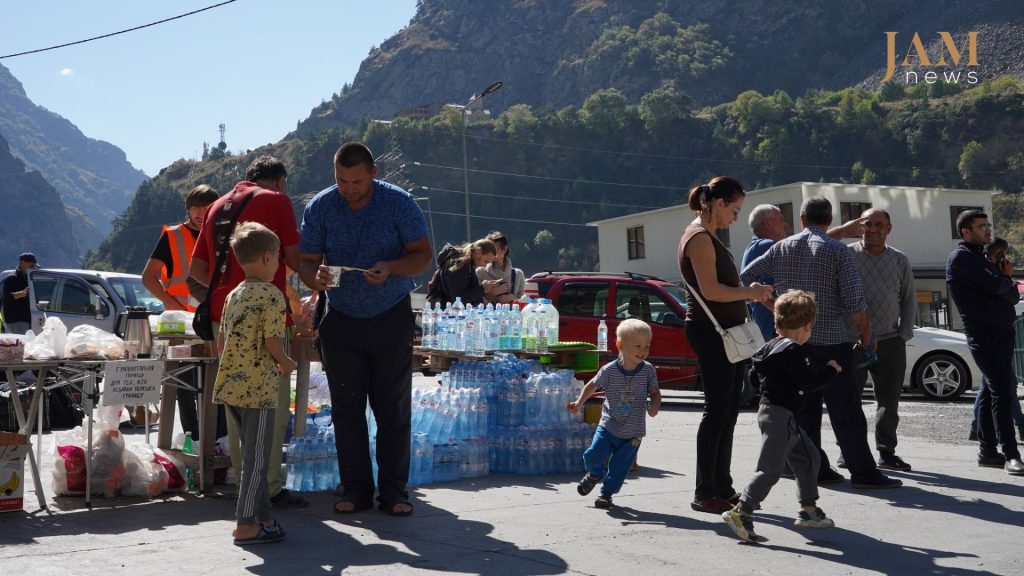
There are no more long queues and traffic jams at the border, but it’s still crowded. Most of the cars with Russian numbers pass customs. Among the cars there are many old Soviet brands.
At the exit from the border crossing on one side of the road is a group of taxi drivers and journalists. As soon as a car with Russian license plates approaches, the cameras immediately turn on.
Those who go out have to literally fight back first taxi drivers, then journalists. The fare from Lars to Tbilisi starts at $100 per person.
The last “checkpoint” are the volunteers. The Russians,who arrived in Georgia back in February set up a kind of humanitarian aid center.
There is bread, fruits, biscuits, coffee and tea on wooden tables. Dozens of bottles of drinking water lie on the ground. Here you can find the most necessary medicines and hygiene products.
Some who have entered Georgia avoid talking to journalists. Some people say they are just traveling. But most do not hide the real reason.
On their faces are fatigue, fear and confusion. Many ran from the war with virtually no belongings – with only a backpack. People do not know what they will do after they get enough sleep. Some say they will go on to Turkey or Azerbaijan.
Eugene and Yulia
Julia and Evgeny left the city of Gatchina, Leningrad Region. Julia warms her hands on a cup of tea. Long red hair peeks out from under a cap.
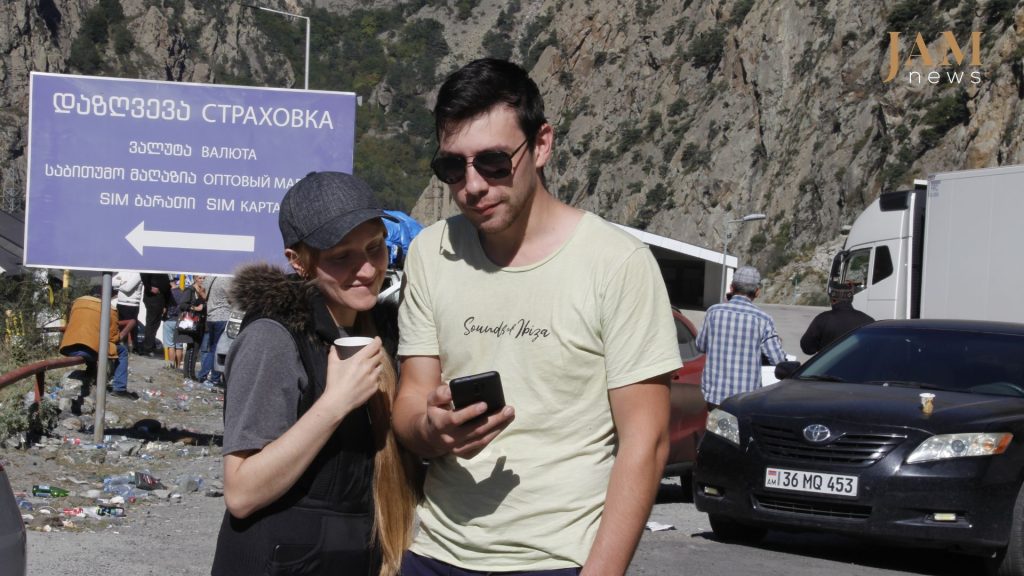
Julia taught French and English at the Gatchina school. She got married a few years ago to Eugene, an electrician. They worked together and lived peacefully until Russia started a war in Ukraine. The family wanted to flee as soon as the war began, but stayed.
“We thought that everything would end very soon. But after the announcement of mobilization we realized that nothing would end, on the contrary everything was just beginning. It’s only going to get worse.”
To get to Georgia, Yulia and Evgeny spent about $450 and five days and nights. There was the same fear, traffic jams, lack of water and hunger along the way. It was especially difficult to get out of North Ossetia:
“The police blocked everything. They don’t let you into Vladikavkaz, they say that you can’t go. At the same time, they cannot produce a single official order that would confirm that it is forbidden to go further. And the locals offer to bring you to the border for different amounts. Some are asking for 15,000 rubles [about $215], others for 300,000 [about $4,300]. It turned out that these people are acquaintances of the police and just earn money from those who are trying to escape.”
The young couple overcame the first obstacle with the help of the Kabardians. However, they had to pay 20,000 rubles [about $280]:
“They picked us up in the field, took us to a detour. They were in front and we were in the back. We were stopped several times by the police. To go further, each time we paid about 10-15,000 rubles. At the entrance to Vladikavkaz we were again stopped and interrogated. We said that we were going to Dzheirakh (in Ingushetia) with friends. During one of the interrogations, my husband was confused and said Dzheyruh instead of Dzheyrakh. They realized that we were lying. He was told that we know you are going to Georgia, go and pay. And we paid again.”
Julia and Evgeny got to the traffic jam near the border. They did not move for more than three days and nights. Then Julia , four months pregnant, thought that she could not stand it any longer.
“When we crossed the border and entered Georgia, I felt that I was sick of hunger. It’s good that the first “checkpoint” in Georgia is friends who feed and water you.”
Julia and Evgeny are going from Lars to a relative in Kvemo Kartli, in a village in Marneuli. Yulia says that later they will move to Azerbaijan:
“Now I am four months pregnant. First of all, I need to find a quiet place to have my baby in peace.”
The couple does not plan to return to Russia. As soon as the war began, Yulia was summoned to the prosecutor’s office and asked to write an explanatory note, as she had signed an anti-war petition.
“It became very difficult to live there. What will I teach my students – how to live in fear?! Everyone knows what is really happening, everyone has someone in the war – a family member or at least a relative.
Julia and Evgeny hope that in time they will be able to travel to Canada.
Alexander
“Last night we entered Georgia. And I think that we were very lucky, because we learned that today cars are no longer allowed from Vladikavkaz to Georgia,” Alexander, who came to Georgia from Moscow, told me.
The little red Honda Alexandra is full of stuff. Sleeping bags are also here – interspersed with clothes.
“When we left Moscow, many said that it was not worth going this way. The central channels showed how difficult the road is, Georgia is closing the border tomorrow. At the same time, I already knew from acquaintances that the mobilization was not partial. In fact, everyone is called, including the sick. That’s why I had to take the risk.”
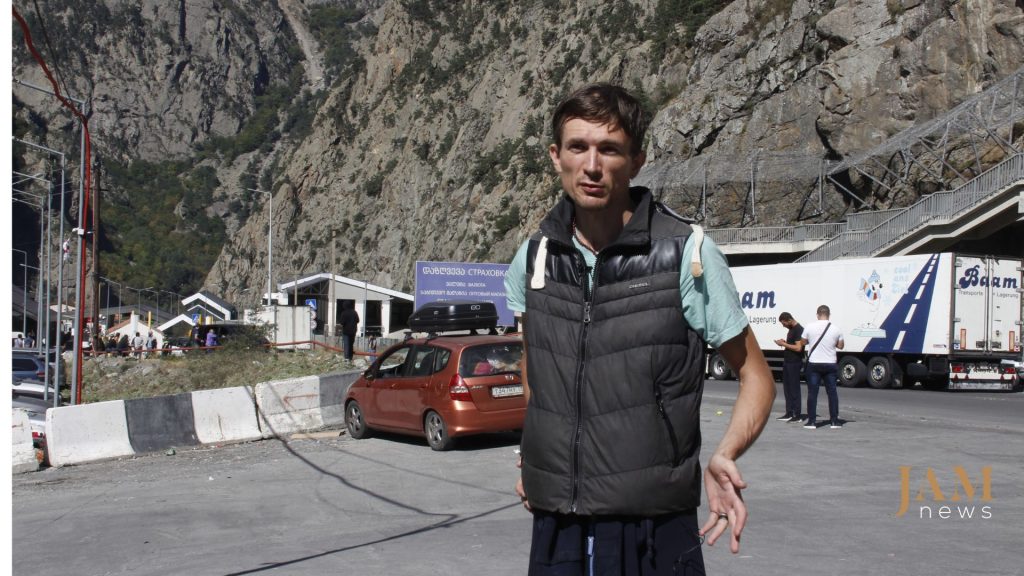
Alexander was about to leave Moscow with his wife and children. But he did not dare – his son is only a year old. So the family stayed in Moscow.
The road was very difficult. Infernal, in his words. Hell begins in Vladikavkaz.
“A lot of checkpoints where they ask you a thousand stupid things, they check you, they check your car. Everyone understands that you are going to Georgia. They tell you that you cannot cross the border, you cannot leave. When asked how to get there they answer that there is a detour, but you have to pay 200-250,000[about $2,800-3,500]. And there is no guarantee that you will be able to pass. If you plan to travel through the city, then at all checkpoints you will have to pay an average of 30,000 rubles [about $430].”
Alexander took the risk. Fortunately, he was not stopped at any checkpoint:
“Others were taken to one place, then to another. They asked for more money. You can drive one kilometer for 30,000 rubles. And then they just throw you in the middle of the road.”
Alexander knows that not everyone in Georgia welcomes refugees from Russia.
One of the opposition parties even held a protest in Kazbegi not far from Lars. “Russian deserters not welcome” was written on a large banner. “Hello to Russian deserters” – another poster at Tbilisi airport.
“We didn’t do anything wrong. It’s not just a call to war. Women, for example, are not called anywhere. But staying in the country has become dangerous. People are divided into those who support the war, and those who do not. And those who oppose are in danger.”
According to Alexander, most of the arrivals will not stay in Georgia. Some will go to Turkey, some to Azerbaijan or Israel. He is personally going to Turkey:
“While in Tbilisi I will sleep, I haven’t slept for several days.”
Thousands of Russians have fled their country
Alexei, 33 years old
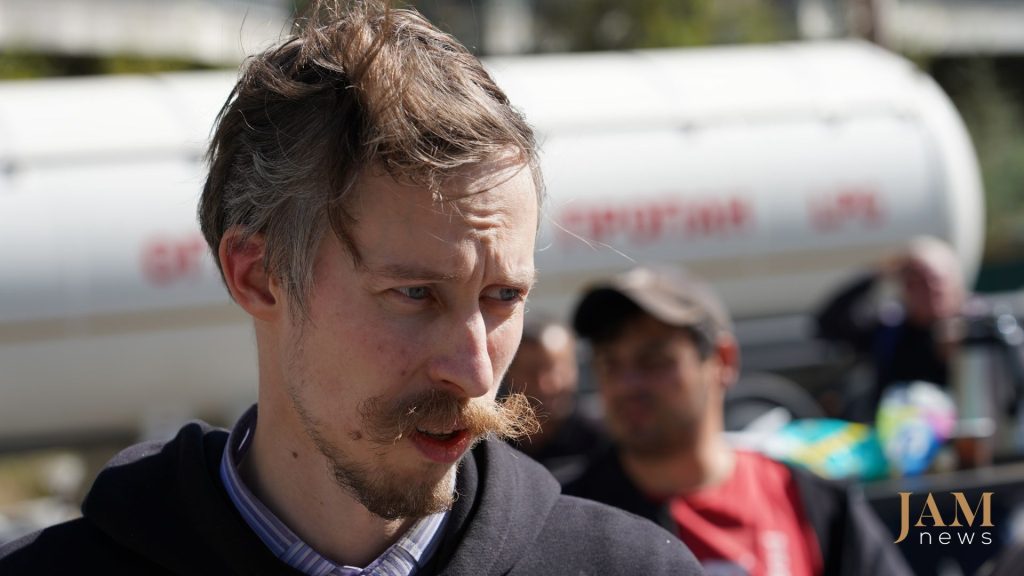
33-year-old director Alexei came to Georgia from Moscow. He crossed the border with a friend in a car. He was going in a hurry, only managed to take his favorite guitar, computer, personal items and some food:
“This was my last chance. If the border was closed, my only option would be to go to war. But I don’t want to kill people. I had to run anyway. Yes, not everyone is being called up yet, but soon they will get to everyone.”
Alexei says it was terrible on the road:
“Huge lines. If you fell asleep, you lost your place. So we didn’t sleep for two nights. It was chaos. People were terribly angry, there were fights. Then the police began to regulate the situation.”
Alexei left his parents and brothers in Moscow. His father is a military pilot. Alexei fears that, despite his age, he may be drafted into the army. But his father cannot leave the country. Alexei is also afraid for his brothers. One of them, a 24 year old, was being looked for by the military registration and enlistment office:
“When my brother saw their car in the yard, he locked the door. And he didn’t open when they called, he just hid. Another brother is 17 years old, I also worry about him. If this continues, he will be 18 years old. And he, too, can be called. This is a senseless war, a terrible war.”
Alex doesn’t know what to do yet. He doesn’t have a plan. The most important thing now is to get to Tbilisi:
“I want to sleep, I want to recover. Then I’ll think about what I can do. I could go to Turkey.”
Serafim, Natalia and 3-year-old Savva
As soon as mobilization was announced in Russia, people began to leave the country. On the same day, all tickets for direct and indirect flights from Russia to countries where Russians can enter without a visa were sold out. Tickets for the following days began to cost two or three times more.
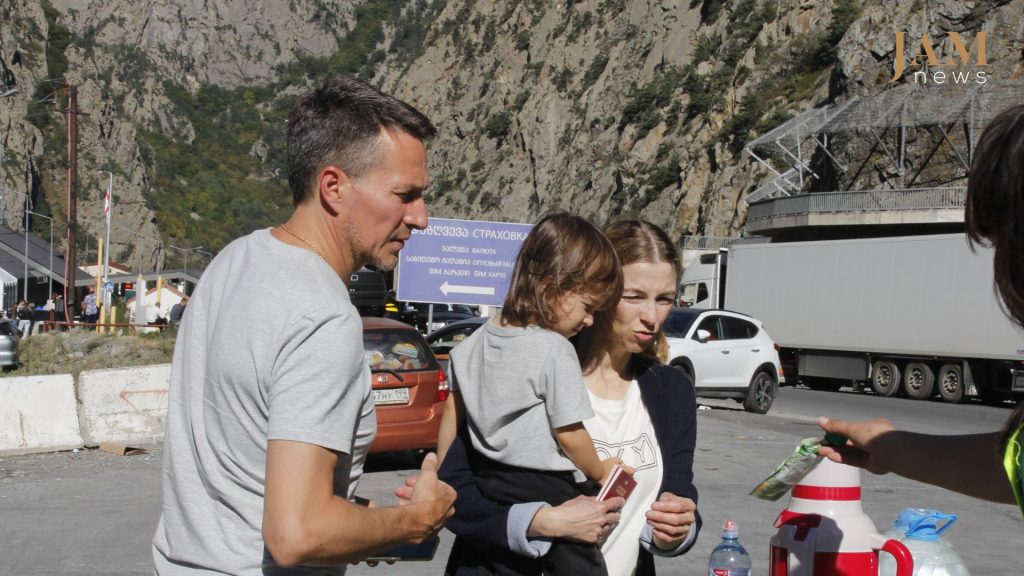
Serafim and Natalya, together with three-year-old Savva, wanted to fly from Rostov to Tbilisi by plane. But they couldn’t buy tickets and drove across the land border in their grandfather’s car:
“We ran out of food, water, gasoline, patience, everything. From the middle of the road we turned, stayed a couple of days in the village of Chmi [a village in North Ossetia – JAMnews]. We slept, rested and continued on our way. If we had known that there would be such traffic jams, we would have spent three days at home, would have sat quietly and then left. We slept with the baby in the car for a week.”
Seraphim and Natalia have a daughter, Natalia, in Batumi. She is married to a Ukrainian and arrived in Batumi in February, immediately after the start of the war. Her parents are going to join her.
Seraphim worked in a car repair shop in Rostov. He had a good income. He and his wife had no intention of leaving, and so far they do not know if they will stay in Georgia. Seraphim says that first he needs to see what is going on here:
“It’s very difficult to get up like that, drop everything and leave. It all depends on whether I find a job here and how much the property costs.”
Thousands of Russians have fled their country
Vladislav, 35 years old
A young slender man in a red t-shirt and black sweatpants eats instant noodles at the volunteer table. His phone keeps ringing.
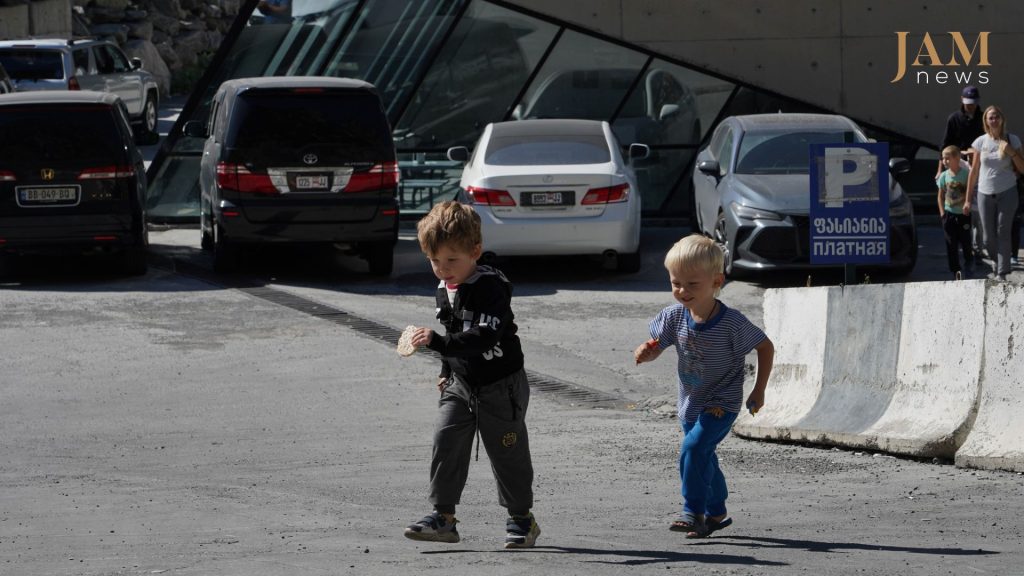
Vladislav (name changed) came from St. Petersburg. He traveled five days from Vladikavkaz to Upper Lars.
“There was a day when I only advanced 30 meters. The worst thing is that you can’t sleep. If you fall asleep, you will either lose your place in line or you will be robbed. Incredible stress. Some ran out of gas. For example, six liters were sold for 10,000 rubles [about $140]. It was impossible to buy food and water. Then volunteers showed up and started distributing food.
“I crossed the border both in Russia and in Georgia easily – they didn’t ask anything special. ”
Vladislav left a small son and a business in St. Petersburg – a freight forwarding company. Now he is going to study the situation in Georgia and Turkey. And if he finds that he can start a business, he will sell his property in Russia and settle here:
“I’m not going to hide and leave everything. I have a son there. Yes, I’m afraid, very afraid. But you can’t just leave it like that. I had my own business. I try to work on the phone, but nothing works. So I need to get back. I’ll see if I find something here, maybe I’ll sell everything in Russia and leave.”
Dmitry and Elena – from Melitopol to Tbilisi
Among those fleeing the war from Russia there are also citizens of Ukraine, those who live in the occupied territories.
Dmitry, 51, came from occupied Melitopol to Georgia with his wife Elena, their young son and mother-in-law. Melitopol is a city in Ukraine occupied by Russian troops. A few days ago there was a referendum on joining Russia.
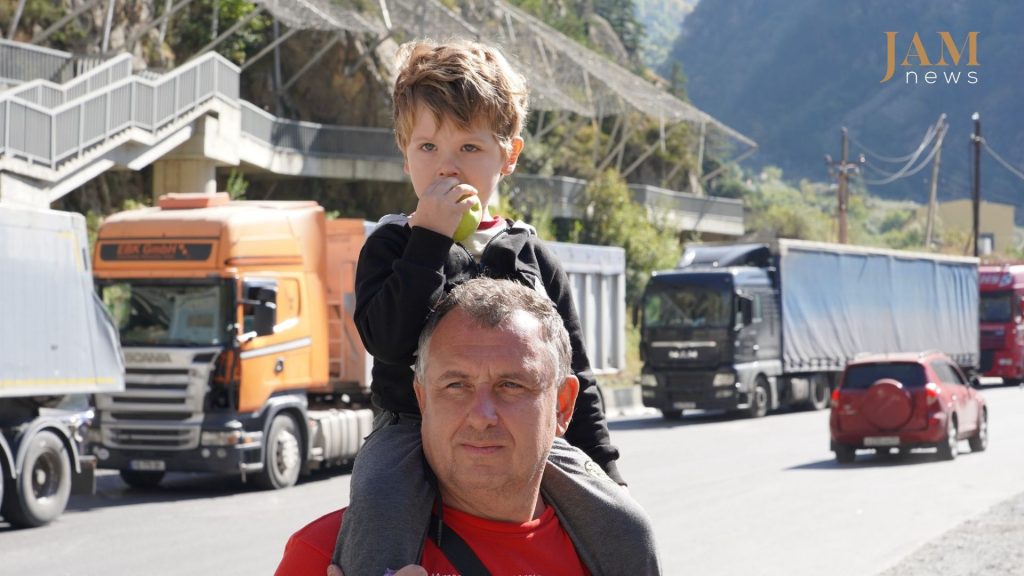
Thousands of citizens fled from Russia
Dmitry was afraid that after the fake referendum, which was allegedly held at gunpoint in Melitopol, local residents would also be called to war:
“Our collaborationist government has published a statement in the newspaper that there will be no conscription. But everyone is fighting. I do not know what it means. I can’t imagine a war against my own country. I’m just trying to save my family. I do not want to live in Russia. I don’t want to fight against my people.”
Melitopol is located in Zaporozhye Oblast. It was risky to get through Zaporozhye because there are Russian soldiers stationed there. So Dmitry decided to go through Crimea:
“We chose a long and difficult path. We were on the road for five days and nights. Then we got into the queue in Ossetia. No water, no toilet. Locals go and look around, if someone falls asleep, they rob them. You can wake up and find nothing in the car.”
Dmitry’s mother-in-law, Nadezhda, says they were treated like cattle:
“It started in North Ossetia – wherever you go, they don’t let you in, you just stand in the field. We were stopped, sent to the field, gathered in one place, like in a ghetto. No toilet, no water. Pregnant women, small children. There was one woman with a six-month-old baby. We begged them to send us somewhere where we could spend the night.”
Then the police made a list of people moving towards the border. They were number 103.
“We told them we couldn’t wait that long, we no longer had baby food. My son and I went to the police, cried, begged to be let through with a small child,” recalls Nadezhda.
It worked. Three cars with small children were let through without a line.
Then a few more days in a kilometer traffic jam, between two or three columns of cars and, finally, Georgia.
On the Georgian border everything was easy – they were asked almost nothing.
Dmitry and Elena will stay in Georgia for several days then go to Italy. Elena’s sister lives there. Nadezhda says that it is dangerous to return to Melitopol:
“During the referendum a car with soldiers and a ballot box drove around for three days in a row. The soldiers went from house to house and forced us to vote. When I told them that I would not vote, they put me on some list. Yesterday we heard that civilians were killed. People are scared. So it’s very dangerous to stay there.”
“Everything was fine with us – the house, our affairs, we had plans. We never thought about starting a new life like this. It is very difficult, we left everything there – full refrigerators, cellars, everything that we have prepared for the winter,” Dmitry rues.
In the past few days the number of people leaving Lars has decreased. According to the Ministry of Internal Affairs, on September 29, 6,109 people entered Georgia through the Upper Lars checkpoint, and 5,186 people have left.
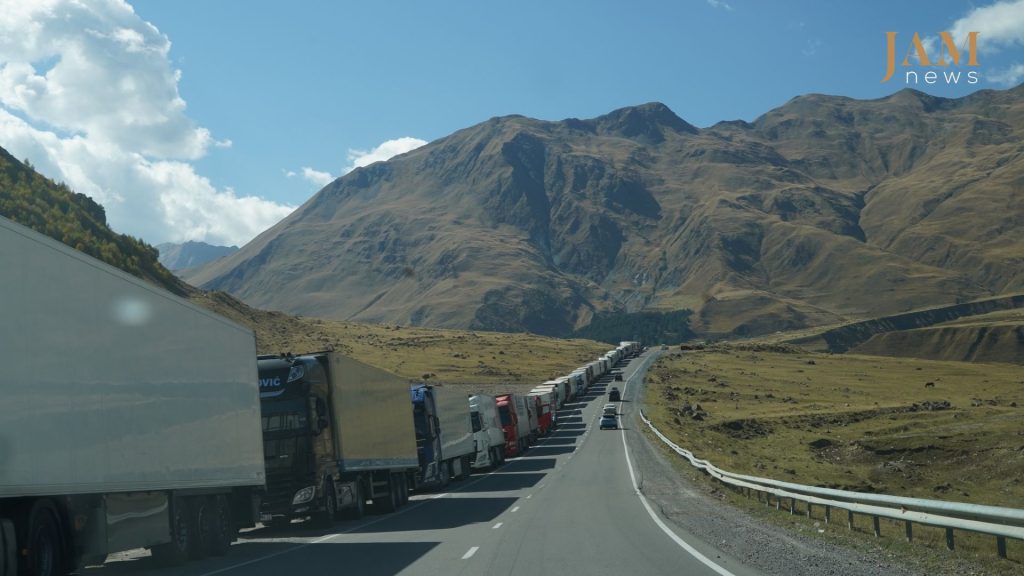
According to the Ministry of Internal Affairs, interrupted transit has been restored at the Daryal checkpoint. Kazbegi, Georgia. October 1, 2022 Photo: David Pipia / JAMnews
Volunteers stand at the border post every day to help new arrivals.
“20% of the territory of Georgia is occupied by Russia” – a poster bearing this slogan greeted Russians entering on October 2. They are told that they had come to a country that has experienced Russian aggression.
Thousands of Russians have fled their country










